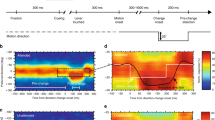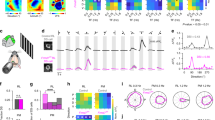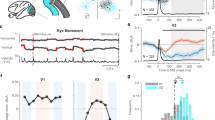Abstract
Neurons in area V4 of the macaque are generally not selective for direction of motion, as judged from their response to directional stimuli presented after a baseline condition devoid of movement. We used motion adaptation to investigate whether stimulation history influences direction-of-motion selectivity. We found that classically nondirectional V4 neurons develop direction-of-motion selectivity after adaptation, an observation that underscores the dynamic nature of functional cortical architecture.
This is a preview of subscription content, access via your institution
Access options
Subscribe to this journal
Receive 12 print issues and online access
$209.00 per year
only $17.42 per issue
Buy this article
- Purchase on Springer Link
- Instant access to full article PDF
Prices may be subject to local taxes which are calculated during checkout



Similar content being viewed by others
References
Zeki, S.M. J. Physiol. (Lond.) 236, 549–573 (1974).
Barlow, H.B. Perception 1, 371–394 (1972).
Kohn, A. & Movshon, J.A. Nat. Neurosci. 7, 764–772 (2004).
Tolias, A.S., Smirnakis, S.M., Augath, M.A., Trinath, T. & Logothetis, N.K. J. Neurosci. 21, 8594–8601 (2001).
Desimone, R. & Schein, S.J. J. Neurophysiol. 3, 835–868 (1987).
Leopold, D.A. & Logothetis, N.K. Exp. Brain Res. 123, 341–345 (1998).
Maunsell, J.H. & Van Essen, D.C. J. Neurosci. 3, 2563–2586 (1983).
Ungerleider, L.G. & Desimone, R. J. Comp. Neurol. 248, 190–222 (1986).
Grill-Spector, K. & Malach, R. Acta Psychol. (Amst.) 107, 293–321 (2001).
Kourtzi, Z., Tolias, A.S., Altmann, C.F., Augath, M. & Logothetis, N.K. Neuron 37, 333–346 (2003).
Moran, J. & Desimone, R. Science 229, 782–784 (1985).
Tolias, A.S. et al. Neuron 29, 757–767 (2001).
Mazer, J.A. & Gallant, J.L. Neuron 40, 1241–1250 (2003).
Schiller, P.H. Vis. Neurosci. 10, 717–746 (1993).
De Weerd, P., Desimone, R. & Ungerleider, L.G. Eur. J. Neurosci. 18, 1671–1691 (2003).
Acknowledgements
This study was supported by the Max Planck Society, a National Research Service Award from the National Eye Institute (NEI) of the US National Institutes of Health to A.S.T. and a KO8 award from the NEI to S.M.S. We thank S.-P. Ku, G. Rainer, T. Siapas and N. Sigala for helpful discussions and J. Werner for computer support.
Author information
Authors and Affiliations
Corresponding author
Ethics declarations
Competing interests
The authors declare no competing financial interests.
Supplementary information
Rights and permissions
About this article
Cite this article
Tolias, A., Keliris, G., Smirnakis, S. et al. Neurons in macaque area V4 acquire directional tuning after adaptation to motion stimuli. Nat Neurosci 8, 591–593 (2005). https://doi.org/10.1038/nn1446
Received:
Accepted:
Published:
Issue Date:
DOI: https://doi.org/10.1038/nn1446
This article is cited by
-
Speed tuning properties of mirror symmetry detection mechanisms
Scientific Reports (2019)
-
The feature-specific propagation of orientation and direction adaptation from areas 17 to 21a in cats
Scientific Reports (2017)
-
Dynamics of contextual modulation of perceived shape in human vision
Scientific Reports (2017)
-
Mirror neurons in monkey area F5 do not adapt to the observation of repeated actions
Nature Communications (2013)
-
Bringing the real world into the fMRI scanner: Repetition effects for pictures versus real objects
Scientific Reports (2011)



